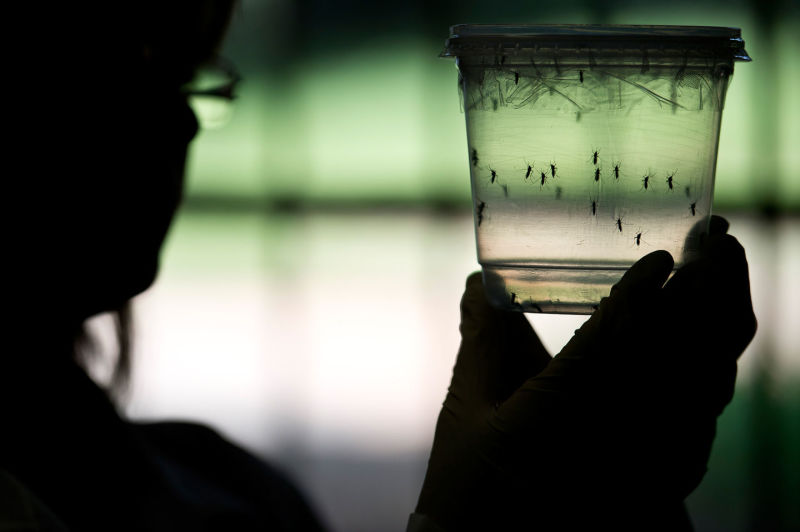Microcephaly hadn't been seen in past Zika outbreaks. Babies with the condition have a smaller than normal head and often have a smaller brain that hasn't developed properly. Lab tests have detected the virus in the brain tissue of a few babies with microcephaly.
Proving the cause is a bit like prosecuting a murder investigation, with Zika as the apparent killer but a lot of unanswered questions, said Dr. Ernesto Marques, a University of Pittsburgh microbiologist who is collaborating with Brazilian researchers.
"What you have so far, the victim is there, and you find a person right there that has a smoking gun in his hand," Marques said. "But you still need to close the deal."
The investigation poses special challenges. There's currently no good animal substitute for humans to study the virus. And it's not considered ethical to infect people, especially pregnant women, in an experiment to see what happens — not when there seems to be a real chance that a volunteer could be seriously harmed.
So researchers are turning to other kinds of studies to try to establish whether Zika or some other factor is causing the birth defect or, also, a paralyzing condition called Guillain-Barre. Five Latin America countries with Zika outbreaks are reporting an uptick in that condition in adults.
One method is quick-and-dirty research called a case-control study, which looks back in time after an illness or condition has occurred. For the birth defect research, that means recruiting a group of women with babies born with microcephaly and trying to sort out what may have happened during their pregnancy to spark the condition. For comparison, they will query women whose infants don't have the birth defect.
The U.S. Centers for Disease Control and Prevention is involved in one such a study set to start next week in the Brazilian state of Paraiba. It will focus on 100 babies with microcephaly and at least 100 more without.
Investigators will take blood samples from the mothers to check for signs of an earlier Zika infection. They also will ask not only about Zika infections but other possible factors, like other germs or poisons in the environment. Some experts suggest that perhaps Zika needs an accomplice — like malnutrition or an infection with another tropical illness like dengue — to cause serious problems.
A similar study, led by Brazil, is investigating 200 babies with microcephaly and 400 without. Results are due in April.
"That will be the first one to tell us if there's strong evidence," Dr. Marcos Espinal of the Pan American Health Organization told reporters Thursday.
The CDC was in the coastal city of Salvador last month to help health officials with another look-back study, this one targeting Guillain-Barre. They tested 40 people who had the condition, and 80 people who didn't, said Dr. James Sejvar, who led the CDC team.
Such studies are hardly perfect. People often have trouble remembering every detail from six months ago — for example, when they might have been bitten by mosquitoes, the primary source of Zika infections.
While these studies can sort out potential causes, experts say they need to be confirmed with research that follows people forward. Colombia, for example, will be following 2,000 Zika-infected pregnant women to see what happens with them and their pregnancies, Espinal said.
In Brazil, Zika's possible link to microcephaly emerged in September, when a spike in babies born with the condition got the attention of Dr. Vanessa van der Linden, a pediatric neurologist at a hospital in northeast Recife that works with disabled children.
Initially, Van der Linden and other doctors looked for the usual causes of microcephaly, such as toxoplasmosis, rubella, HIV, and cytomegalovirus. None were found.
But most of the mothers had something in common: blotches and skin rashes early in their pregnancies that seemed consistent with Zika. That was the genesis of the link.
It's all been difficult to sort out, though, because Brazil wasn't keeping good track of microcephaly cases before Zika arrived. They're still determining how many of the reported cases are really microcephaly and involve a Zika infection.
One of the puzzling questions facing researchers: Why have so many severe health problems been reported in Brazil, but comparatively few in other Latin America or Caribbean countries with Zika? Will we soon see similar spikes elsewhere, or is the Brazilian setting somehow unique?
Health officials are closely watching Colombia, which had a Zika outbreak after Brazil and so far has not seen a spike in microcephaly cases. If there is, it would be apparent by June and would help finger Zika as the culprit, Espinal said.
It will take a combination of studies and laboratory evidence to finally determine if Zika is the villain it appears to be, experts say.
"This is going to be solved," said Dr. Farrah Mateen, a Harvard researcher. "It's just a matter of doing the research in the right way."
